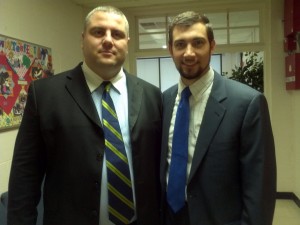Baby Bishops: Aye or Nay?
A lot was said about ordaining younger ministers around the 2012 Assembly. The proposed Item 25, properly numbered recommending lowering the age requirement to 25 years, did not pass. Naturally, discussions stopped perhaps in wait for the next Assembly. But the question still stands open before our church.
My personal opinion was like many others on the floor. If we had to wait, they should have to wait too. But this self-centered conviction changed suddenly as we were invited to preach at the Higher Praise church in Cherry Log, GA pastored by Rev. Stephen D. Henderson (age 28 at the time).
This goes against every organizational rule we have, because when an active pastor is not allowed to vote in business sessions, the congregation he pastors is left voiceless. Alas, all business carried at the assembly affects the said church, which basically has no representation in General Council. So if a church pays for its young pastor to be sent to Assembly and represent the congregation, but without the right to vote this representation does not amount to much in the end. There is something fundamentally wrong with this.
The argument of age is of course connected with one’s experience. But let’s face it, multitudes of pastors leave the ministry for one reason or another having already gained both age and experience. And unfortunately, so many of them leave exactly because of the experience they have had aging within the church. Actually in today’s world, if you have not gained enough life experience and if you don’t know yourself by age 25, you will most probably not gain what’s needed by age 30.
Therefore, if a man is appointed a pastor of a church by consideration and approval of the Administrative Bishop, he should be allowed to vote. If he is trusted enough to take care of the church’s spiritual life and business, surely he must be trusted to represent his congregation and vote toward its betterment as a part of the whole organization. Not doing so is not simply discriminative against the minister on the basis of age, but against the church he leads as well. And yes, this argument goes further to support women who have been entrusted and appointed to serve as church pastors as well.
Pastor-Agents of the Secret Communist Police in Bulgaria Revealed
Silence in the face of evil is itself evil: God will not hold us guiltless.
Not to speak is to speak. Not to act is to act.
Dietrich Bonhoeffer
Pastors who served as agents of the secret police during the Communist Regime in Bulgaria are being revealed this week through special legal provision of the Bulgarian Constitution, which allows secret government dossiers and archives to be made public. The law excuses ministers who are retired, immigrated or deceased as it pays special attention to people who continue to serve on denominational boards, heads of religious organizations or church pastors.
The released records have revealed a significant count of Bulgarian evangelical pastors, who have served directly under the Communist government as secret agents and are currently serving in lead positions in their respective churches and denominations. At least 17 agents have infiltrated the Pentecostal churches in Bulgaria (including the Assemblies of God, Church of God and other charismatic denominations). The count is overwhelming in comparison with the Bulgarian Orthodox Church representing some 90% of Bulgaria’s general population with only 11 regional bishops with secret police dossiers.
The newly released documents reveal that these pastor-agents served the Regime through willfully betraying and reporting fellow ministers and their respective ministries, regularly submitting the names of new believers joining their congregations and the activities of their churches as a whole. Special interest in their reports seems to have been given to “foreign religious emissaries” – missionaries from sister-denominations in other countries who visited Bulgarian evangelicals with the purpose of bringing moral and financial support, smuggling Bibles or just encouraging the churches during their time of trials and tribulations under the Regime.
Even more disturbing is the lack of definite and unified response on behalf of the current denominational leaders and the repulsiveness of the general public on the issue as a whole. While the Bulgarian Evangelical Alliance appealed for prayerful but fair dealing with the said misconducts, the Bulgarian Assemblies of God has chosen to deal with the issue internally behind closed doors and the Church of God in Bulgaria has postponed discussion to its general meeting in March or perhaps May. Several outspoken leaders from the Congregational and Apostolic churches have been unsuccessful in bringing about a public debate involving all Bulgarian Protestants, while journalistic investigations in the Christian media have been openly attacked in attempt to be kept silent.
It is understood that many of the said pastor-agents were coerced to serve as such through pressure in their jobs, friends, families and in some cases even their children. Yet, the Bulgarian churches are now struggling to cope with the fact that leading ministers within their denominational structures have continually and purposefully reported on the life of the church, thus betraying fellow believers and ministers.









